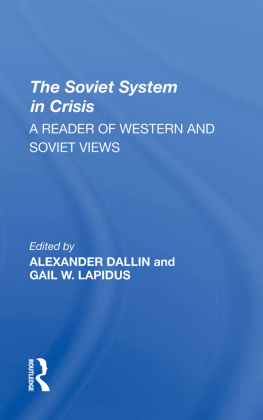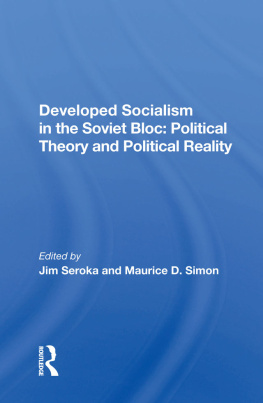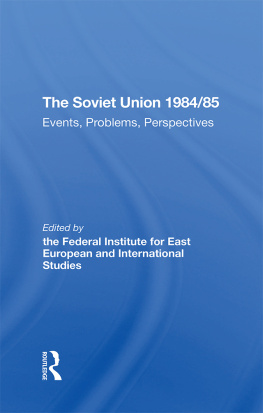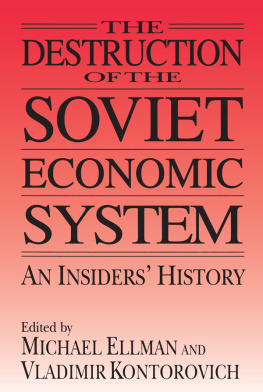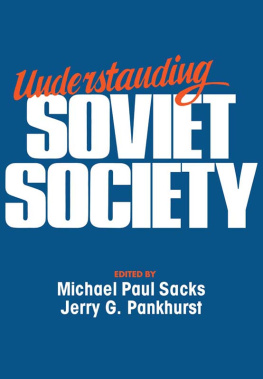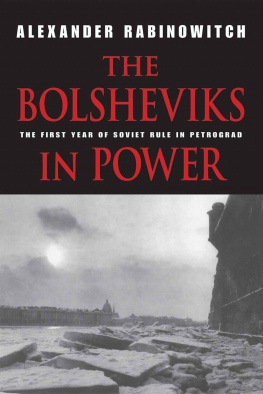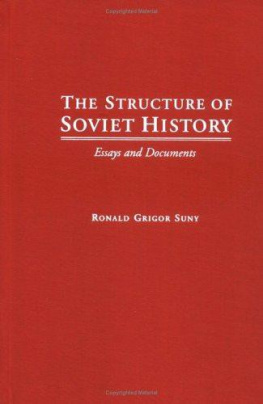First published 1991 by Westview Press, Inc.
Published 2019 by Routledge
52 Vanderbilt Avenue, New York, NY 10017
2 Park Square, Milton Park, Abingdon, Oxon OX14 4RN
Routledge is an imprint of the Taylor & Francis Group, an informa business
Copyright 1991 Taylor & Francis
All rights reserved. No part of this book may be reprinted or reproduced or utilised in any form or by any electronic, mechanical, or other means, now known or hereafter invented, including photocopying and recording, or in any information storage or retrieval system, without permission in writing from the publishers.
Notice:
Product or corporate names may be trademarks or registered trademarks, and are used only for identification and explanation without intent to infringe.
Library of Congress Cataloging-in-Publication Data
The Soviet system in crisis : a reader of Western and Soviet views / edited by Alexander Dallin and Gail W. Lapidus.
p. cm.
Includes bibliographical references.
ISBN 0-8133-8190-8 (hardcover).ISBN 0-8133-8191-6 (pbk.).
1. Soviet UnionPolitics and government1985- . 2. Soviet Union Economic conditions1985- . 3. Perestroka. I. Dallin, Alexander. II. Lapidus, Gail Warshofsky.
DK286.5.S685 1991
947.085'4dc20
91-12762
CIP
ISBN 13: 978-0-367-29606-3 (hbk)
Contents
PART 1
Introduction
, Alexander Dallin and Gail W. Lapidus
PART 2
The Roots of Perestroika
, S. Frederick Starr
, Richard Pipes
, Seweryn Bialer
, Peter Hauslohner
, Stephen F. Cohen
, Andrei Sakharov, Roy Medvedev, and Valery Turchin
, David Remnick
PART 3
Reform and the Political and Social System
, Thomas Remington
, Archie Brown
, Gail W. Lapidus
, Victoria E. Bonnell
, Aleksandr Meerovich
, Leonid Gordon and Eduard Klopov
, George W. Breslauer
, Peter Reddaway
, Jerry F. Hough
PART 4
Soviet Political Debates
, Josephine Woll
, Thomas Sherlock
, Nikolai Shmelev
, Vasily Selyunin
Aleksandr Tsipko
, Mikhail S. Gorbachev
, Mikhail S. Gorbachev
, Boris Yeltsin
, Nina Andreyeva
, Aleksandr Prokhanov
, Oleg T. Bogomolov
, Yuri Katasonov
PART 5
The Economy
Ed A. Hewett
, Gertrude E. Schroeder
, Ed A. Hewett
PART 6
Nationalism and the Future of the Federal System
, Ronald G. Suny
, Gail W. Lapidus
, Roman Szporluk
, Zvi Gitelman
PART 7
Foreign Policy and National Security
, Robert Legvold
, Georgii Shakhnazarov
, Vyacheslav Dashichev
, Alexander Dallin
, Hannes Adomeit
, David E. Albright
, Bruce Parrott
, David Holloway
PART 8
The Future of the System
, George W. Breslauer
, Z (Martin Malia)
, Abraham S. Becker and Arnold L. Horelick
, James A. Baker III
, Edvard Shevardnadze
, Vladimir Kryuchkov
, Alexander Dallin and Gail W. Lapidus
Guide
This book was inspired by a conversation with Frederick Praeger, then publisher of Westview Press, that began with his apparently innocent question about how Soviet specialists taught the contemporary history of the Soviet Union when all standard textbooks had been overtaken by recent events. It was only a short jump from agreement that a collection of new materials was needed to the idea that we should undertake the task of assembling ittestimony to Freds enthusiasm and powers of persuasion. We are very grateful for all the work and wise counsel of Susan McEachern, Beverly Le Suer, and their staff at Westview Press. As usual, the books development turned out to be more complicated and time-consuming than we had thoughtin part because we were shooting at a moving target.
Our thanks go to all the authors, editors, and publishers of books and journals who gave permission to reproduce the titles included here. Some pieces, mercifully, were in the public domain. Special thanks go to those who updated their papers for this collection and to those journals that seem to have made themselves indispensable by carrying a large number of seminal pieces central to intellectual debates among Sovietologists.
In a number of instances we have been obliged to reproduce only selections from longer articles, papers, or books. This reflects no judgment regarding any shortcomings of these works but merely an awareness of the limitations of available space. Some of the cuts and omissions were indeed painful to make. And because we do indicate the source from which our text was takenwe would urge all those who would like to consider the fuller, uncut argument and documentation to consult the original text. We would have loved to include a number of other interesting pieces, but there simply was no room. The rule we tended to follow was to make selections in such a way as to give the reader a fair sampling of diverse opinionsboth American and Sovietas well as the more important contributions to the public debate.
Perfectionists will (properly) complain that this book uses several different citation styles and systems of transliteration from Cyrillic to Latin characters. The general rule we followed was to keep the pieces reproduced in this volume as close as possible to the original. As a result readers will find the same person spelled Yeltsin, Eltsin, and Yel'tsin in different articles. Only in the most outrageous cases have we felt free to alter the spelling or citation form used. Likewise, one consequence of deletions from within certain chapters is the unusual sequence of footnote references, and we can only plead with the reader not to be troubled by having note 14 followed by note 23. These blemishes are regrettable, but (as they used to say in Moscow) what is this compared to the world revolution?
In the process of selecting, assembling, and translating the items reproduced in this volume we were helped by several graduate students at Berkeley and Stanford. We are delighted to express our appreciation for the knowledgeable assistance and dedication of Joseph Brandt, Philip Goldman, Oleg Kharkhordin, Corbin Lyday, Semion Lyandres, Kira Reoutt, Kelly Smith, Amy Weisman, and David Woodruff.
The events in the Soviet Union are as complex as they are fascinating. No single perspective can capture the drama and the promise, the chaos and the collapse. Perhaps this collection can help make them more realand also convey something of the variety of perspectives with which outsiders observe and analyze the Soviet scene.
Alexander Dallin
Gail W. Lapidus

